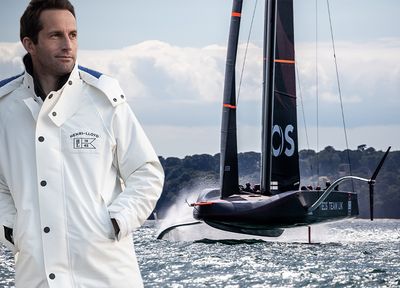
What An Olympic Champion Does Next
Where are you right now, Ben?
I’m in our base in Auckland, New Zealand. We’re getting ready to launch our new race boat this weekend, which is a big moment for the team. We'll be getting the new boat out on the water very soon after that, putting it through some early sea trials and hopefully we’ll very quickly be sailing it up to full speed out on the racecourse – because we don't have a huge amount of time until the first race. There’s a practice regatta on 17th December, so we’re going to have to make every day and every moment we are out on the water count to make sure we get the full potential out of the boat.
And the global pandemic hasn’t set you back too much?
We’ve just done two weeks of quarantine here in New Zealand. We were lucky to be in a nice hotel with a decent room, but it’s tough not being able to get out and about for two weeks! In the UK lockdown, I had a bit of time at home on the Isle of Wight which was a nice opportunity to spend some valuable time with family and my four-year-old daughter. It was frustrating to be held up a little bit in our America’s Cup challenge, but we actually managed to keep the build of our second boat on track, which was the most critical part.
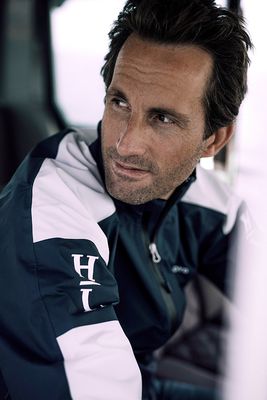
For anyone who’s not up to speed, tell us a bit more about the America’s Cup?
The America’s Cup is the pinnacle of our sport. It was first contested back in 1851 in a race around the Isle of Wight and is the oldest trophy in international sport. Today, it's a 'match race', i.e. one against one. But first the challenging teams battle it out in qualifiers to earn the right to take on the 'defender' in the cup itself. The next edition, the 36th America's Cup, starts in January in Auckland – and we'll be racing in the most radical and technically advanced boats ever.
This isn’t your first appearance in the competition – what happened last time?
In the last America’s Cup we were a first-generation team. That meant building an entire design team, building all the intellectual property we need and building a sailing team – building an entire new organisation really. It was a huge challenge. We achieved a lot last campaign, including winning the America’s Cup World Series, but we just weren’t developed enough technically and weren’t fast enough in the end to win the America’s Cup.
Do you feel ready to win it now?
From that process, we’ve learnt a lot, we’ve made a number of changes to the team and we’re now much stronger for that. Certainly, compared to this point in the last campaign, we are now much further ahead. There is still a long way to go and a lot to achieve to be ready for racing, but I think those lessons learned, and the maturing we have gone through as an organisation, have put us in a much stronger position.
You mentioned the team there – what does an America’s Cup team look like?
It’s a big operation – there are more than 100 of us out here. There’s a really strong squad of boat builders and shore crew, who are very important as there is so much resting on the reliability of the boat. We also have designers and engineers who are absolutely critical to the performance of the boat. Of course, we need some sailors too We have 19 sailors now, with 11 onboard at any given time, and we’ll be rotating some of them throughout the racing to keep everyone fresh and strong. Beyond that we also have everything that goes into a successful America’s Cup organisation, from the human performance team in the gym through to the chefs in the kitchen and the support teams in the office.
The result of that team effort is an America’s Cup boat that looks to us like it’s half-sailing, half-flying. What’s it like to be on board?
They are mostly flying! If we’re doing our job right, it should be flying pretty much the whole time. America’s Cup boats are amazing boats to sail – they can reach around 50 knots (60mph). The raw power is insane really, and they are incredibly impressive to see when they are out on the water and flying around.
It sounds like the races will make for good TV viewing for anyone stuck back in the UK?
Very much so. The TV element of the cup has come on a huge amount. The 2013 America's Cup was ground-breaking for the technology that went into the TV production: they brought in the virtual boundaries on the course, cameras on the boats, and audio coming off the boat. Then there’s the plain fact these boats are now lifting up off of the water and flying around the course. From a viewing perspective, that makes it much more high impact, intense and easier to follow than traditional sailing. It also makes it more appealing to a younger audience – I think it’s got huge broadcast potential as a sport.
You’ve got four Olympic gold medals in the locker. What gets you out of bed and onto an America’s Cup boat?
For me – and for a lot of the team – it’s the fact Britain has never won the America’s Cup. We all have a drive to right that wrong in our maritime history. If we could win the cup and bring it back to the UK for the first time in 170 years, that would be a massive moment – and that’s certainly enough to get me out of the bed in the morning!
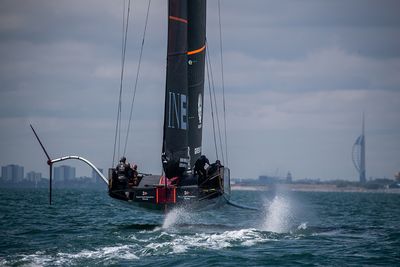
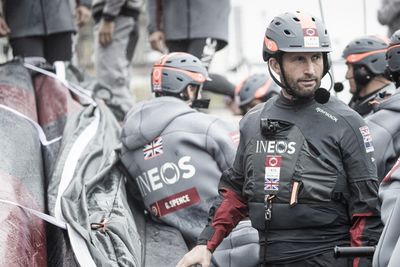
Why hasn’t Britain won this thing for so long?
To be successful in the America's Cup you need three key elements. You need the design talent so you have the fastest boat, you need to have a good sailing team to get the most out of that boat, and you need the funding. For whatever reason we've never been able to get all three key elements together at the same time as a country – until now. I think this is certainly one of the best chances we'll ever have of getting the cup back to British waters, so now we've got to make the most of that opportunity.
That’s quite a responsibility! And presumably quite different from racing singlehanded Olympic boats?
It's totally different. An Olympic campaign is just you in the boat, a coach and a fitness trainer. It's a really small squad and ultimately the results are totally dependent on your own performance. That’s easier in a way: if you're not doing well, you can't look anywhere else, so you've got to look within yourself to work out how to improve and get to the required level. Within a team, however, it's crucial you have good people, that everyone knows their responsibilities, that you've got good communication and co-ordination, and a good team spirit. Without that, you can't be successful. But, from my experience of being successful as a team, it is much more rewarding than anything you'll do as an individual.
What do you think gave you the edge to win gold medals? And then to keep winning them?
I think I’ve just always had a strong determination to be successful and there’s a drive that comes from that. Whether it’s on an individual level or as a team, you always need people to be determined and to want to push for the best from themselves and for everyone around them. In our team now, that’s not just myself, but everyone in the team is responsible for it, especially those with leadership roles. We’re fortunate that we have that as a team. Our CEO Grant Simmer, for example, is similarly driven and focused, which then passes down to the rest of the team. For all of us as a team, there’s only one reason we're down here in New Zealand and that's to try and win the America's Cup. Nothing else really matters.
Would winning the America’s Cup with this team mean more to you than any of your previous medals?
I think so. The medals from a personal perspective are really satisfying but this is a much, much harder challenge and, while I have won the America's Cup, that was for an American team. To win it with a British team would mean so much more. It is certainly my biggest challenge yet.
And how does Henri-Lloyd fit into all of this?
Henri-Lloyd is a British brand, so there’s an affinity there already. But I’ve also got a longstanding relationship with them. They were the first sponsor I ever had in sailing and for many years they gave me a family feeling of support. I definitely have a loyalty to them because of that. Most importantly, though, they have always been right at the top end of the quality in the marine sector. That’s why most of the kit we’ll wear onboard is Henri-Lloyd neoprene. When we’re flying on these boats, there can be a lot of water flying around, so it’s important to keep the sailors warm. And there’s not just the water: there can be wind speeds of over 80 kph running across the deck, so we need to be prepared.
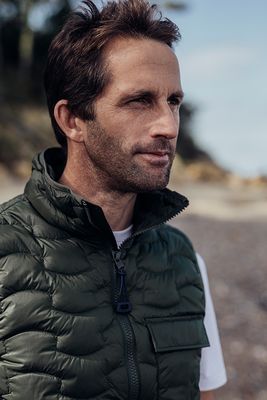
And, as this is SLMan, tell us a bit about your on-shore style…
I wouldn’t say I have a specific style, but I do think it’s important to always come across well and be well presented. I take a passing interest in fashion, but I’m by no means an expert! My wife Georgie, on the other hand, is very into fashion, so I try to keep up so as not to embarrass her too much!
Good luck with everything, Ben. Just finally, do you know what happens afterwards?
Right now, the focus is, of course, totally on the America's Cup. That said, you do need to keep half an eye on the future and what the racing schedule looks like for the rest of 2021. SailGP is certainly something we've got our eye on. It’s a relatively new global circuit that's having huge success so far and has great potential, so it’s one I'm looking forward to being involved with down the line.
To see more from Henri-Lloyd, visit HenriLloyd.com
DISCLAIMER: We endeavour to always credit the correct original source of every image we use. If you think a credit may be incorrect, please contact us at [email protected].